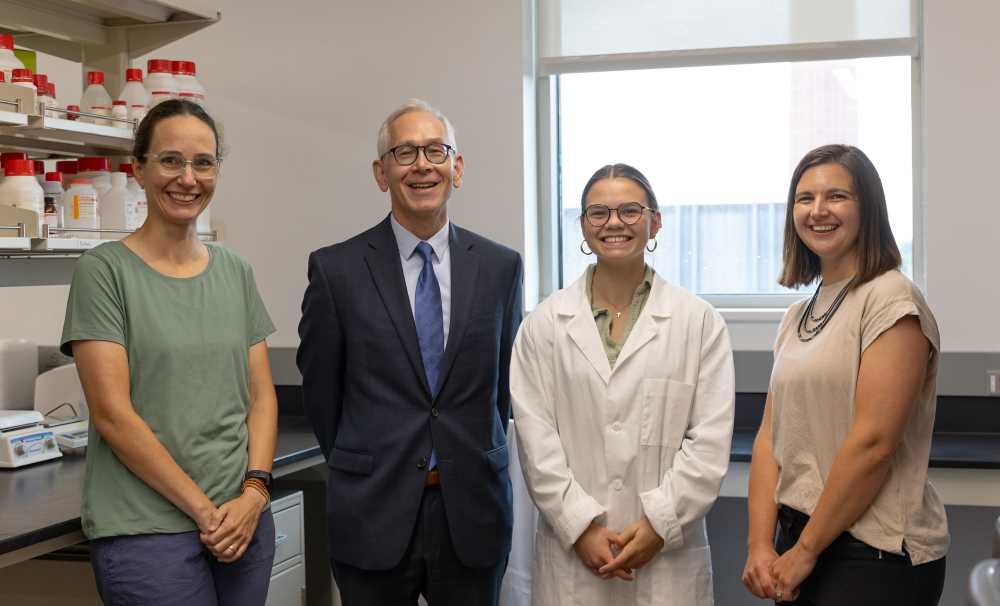
Since 2019, a collaboration between UWL and Mayo Clinic Health System has enabled researchers at both institutions to work together to prepare the next generation of scientists, innovators and health care providers.
Collaborative research projects between UWL and Mayo Clinic Health System are reshaping the landscape of healthcare in the Coulee Region and beyond.
In 2019, UWL and Mayo announced a research collaboration agreement designed to improve the health and wellness of the Coulee Region through research supported by seed grants. The collaboration enables researchers at both institutions to work together to prepare the next generation of scientists, innovators and health care providers.
“We can take a project from the point of students’ brainstorming ideas all the way to clinical testing. That’s a cool and rare thing that we have here, and it’s one of the opportunities available that sets us apart,” says Patrick Grabowski, associate professor of health professions/physical therapy and recipient of a seed grant. “We couldn’t accomplish the clinical part, the most important part, without our partnerships. The local hospitals have been great supporters of our students and programs, and this Mayo Seed Grant Program is a prime example.”
The current seed grant research projects advance research related to breast cancer, using artificial intelligence (AI) in medicine and reducing symptoms of peripheral arterial disease. These research projects include:
- Are megakaryocytes and platelets harmful or helpful in breast cancer cell metastasis?
- The research team hopes to gain a better understanding of the connection between hard-to-treat breast cancer and cardiovascular changes. This research could potentially lead to better diagnostic tools and/or therapeutics. Research findings will provide valuable preliminary data for securing larger extramural funding.
- Pelvic floor muscle assessment with AI-assisted transabdominal ultrasound:
- Transabdominal ultrasound is already known to be a valid method for assessing pelvic floor muscle function, but it requires some cumbersome computer-based measurements. New software that uses artificial intelligence to identify and automatically measure structures within the pelvic region could be used to improve the clinical efficiency of the technique. This would open the door to widespread adoption of these methods in clinical practice, thereby enhancing the patient’s experience. This technology could also have applications in telehealth.
- Passive stretching improves functional walking capacity in patients with Peripheral Arterial Disease (PAD):
- This proposal aims to study how stretching can help patients mitigate symptoms related to Peripheral Arterial Disease. Progress of the research will be tracked through several techniques, including muscle biopsies and blood tests. Since there are limited non-pharmacological options for PAD, this research project leads the first low-cost treatment plan to improve patient physiological function, slow functional decline, and understand how stretching can improve the cardiovascular health and well-being of PAD patients.
Meet the UWL researchers
The research project: “Are megakaryocytes and platelets harmful or helpful in breast cancer cell metastasis?” by Sierra Colavito (UWL), Jaclyn Wisinski (UWL), Scott Okuno (Mayo).
Summary:
This research project aims to investigate the effects of metastatic breast cancer cells on the biological phenotype of platelets, including their proliferation, adhesion, and signaling, plus studying the reverse. Additionally, there’s a more clinical aim in which the team will collect blood samples from patients undergoing biopsies for suspicious mammograms. These samples come from patients in four main cohorts — those that have benign biopsies, those with early stages of disease, those with invasive breast cancer, and those with metastatic breast cancer. The research team will analyze the characteristics of platelets from patients in these different cohorts.
Who: Sierra Colavito and Jaclyn Wisinski, UWL associate professors of biology
How will this project involve students?
We have already supported several students, including two graduate students who received summer stipend support. We have included many other students in this research project that receive course credit for participating.
When will the research get underway and conclude?
We were awarded the grant in spring of 2023, and the grant period will end in April 2025. We anticipate continuing with this research and submitting larger extramural grants.
Written by UW-La Crosse
Link to original story: https://www.uwlax.edu/news/posts/igniting-discovery/
